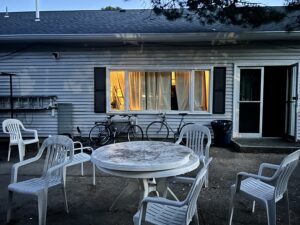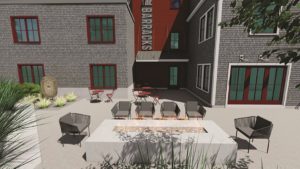ORLEANS — Software entrepreneurs Patricia and Thomas R. Kennedy, who live in Miami Beach, Fla. but own properties in Brewster and Harwich, have purchased the mortgage note for the financially troubled Seashore Park Inn.
Seashore Park has most recently been used as housing for seasonal workers, with Chatham Bars Inn renting rooms for its employees there for at least the last two years.
The inn’s owner, Taylor Perkins, operating as Cape Cod Lodge LLC, filed for bankruptcy last August after defaulting on a $5.1-million mortgage with Coastal Heritage Bank.
Coastal Heritage sold the mortgage note in December to the Kennedys as managers of 24 Canal Road LLC. As of Jan. 2, the outstanding balance on the mortgage was $6.3 million with continuing interest and attorneys’ fees and expenses, according to court documents.
What the Kennedys paid for the mortgage note was not listed in the documents or in online records of the Barnstable County Registry of Deeds.
The bankruptcy court judge approved a motion on Jan. 27 that allows the Kennedys to foreclose on the property and sell it if they wish.
Attorney Jonathan Hixon, who represents the Kennedys, cited in his motion several repairs that were urgent, including leaks in the roof, chimneys, and other areas; a cracked concrete slab creating a structural issue; water damage in one area from a burst pipe; the need to pump the septic system weekly; and a lack of proper winterization.
The Kennedys could not be reached regarding their plans for Seashore Park Inn, and Hixon did not respond to a request for comment.
The Kennedys founded the technology companies BackOffice Associates in 1996 and Zudy in 2013. BackOffice Associates had its offices in Harwich until the Kennedys sold the company to global investment firm Goldman Sachs in 2012.
According to the state’s corporations database, the Kennedys still own the office building in Harwich as well as a 38-acre residential property, made up of seven parcels with several buildings, at 255 Long Pond Road in Brewster.
In 2016, Thomas Kennedy’s move to lease a portion of the couple’s Brewster property for marijuana cultivation drew stiff opposition from his neighbors, according to a Cape Cod Times report. The proposal was abandoned after Christopher Taloumis, president of Haven Center, parted ways with Kennedy, according to that news story.
A Downward Spiral
Maine hotelier Taylor Perkins, operating as Cape Cod Lodge LLC, purchased the 63-room Seashore Park Inn for $5.1 million in July 2022. He covered the purchase with a commercial mortgage and a construction loan, then paid those off in August 2023 with a $5.25-million mortgage from Coastal Heritage Bank of Weymouth.
Perkins failed to make the required monthly payments, however, and Coastal Heritage sent a demand letter in December 2023, calling in the loan. The letter stated that Perkins owed $5,476,000 in principal, interest, and late fees. When the bank received no response from Perkins, it filed a complaint in Norfolk Superior Court demanding full payment of principal and interest.
On Aug. 20, 2024, the Norfolk court endorsed an order granting Coastal Heritage the authority to take whatever steps necessary to gain control of the three-acre Seashore Park property. The bank planned to auction it on Aug. 23, but on the day before the auction, Cape Cod Lodge filed for Chapter 11 bankruptcy in Mass. Bankruptcy Court, putting all actions by creditors on hold.
Because Perkins had no money to support a payment plan under Chapter 11, the filing was quickly moved to Chapter 7, under which a court-appointed trustee liquidates assets to pay off debts. In November, the Chapter 7 trustee filed a motion for “authority to abandon” the motor inn property rather than sell it because its value was less than the mortgage and other amounts owed.
That action removed the hotel from the bankruptcy estate for lack of equity, so it was no longer protected from foreclosure.
While a 2023 appraisal done by the bank valued the inn property at $8 million (factoring in revenue potential), an appraisal done in August 2024 by a firm the bank hired set the “as is” market value at $4.5 million and liquidation value at $3.8 million.
Poor Conditions for Workers
Chatham Bars Inn, the upscale 217-room resort, has relied on Seashore Park for employee housing for at least the last two years. The court documents included a copy of the agreement Perkins signed with Chatham Bars, booking all 63 rooms at Seashore Park from April through October 2023 to house inn employees. Chatham Bars also booked 20 rooms for the month of November. All told, the agreement called for a $94,500 security deposit, $661,500 for April through October rent, and $30,000 for November, at $1,500 per month per room.
Chatham Bars again housed its employees at Seashore Park in 2024 but lodged several complaints about the deteriorating conditions there. On June 6, Chatham Bars Interim Managing Director Paul Zuest sent Perkins a notice of default citing “conditions affecting the health, safety and well-being of the occupants of the premises.”
The list included failure to provide electricity at levels that would allow operation of kitchenettes without triggering the circuit breakers, a standing pool of sewage in the parking lot, failure to regularly empty dumpsters, unreliable air conditioning units, broken refrigerators, and plumbing failures and leaks. The letter included deadlines for repairs and said partial rent would be withheld until the work was done.
On June 17, Chatham Bars sent a notice of additional defaults. The list this time included wet carpeting and mold, leaking faucets and showers, and one report of an electric stove catching fire among other issues. The property manager responded by removing the burners and unplugging the stove, which caused the refrigerator to lose power and start leaking. Chatham Bars would undertake the repairs if necessary, wrote Zuest, since the issues were so serious that a prompt response was required. Any expenses incurred would be subtracted from rent.
In November, attorney Derek Domian, representing Chatham Bars in response to a demand for unpaid booking fees sent by Perkins, wrote that conditions at Seashore Park remained unresolved.
Chatham Bars rejected the demand for payment, wrote Domian, since its managers had instructed Perkins to use the $96,000 security deposit being held by Cape Cod Lodge to cover any amounts Perkins thought he was owed. In response to Perkins’s threat that he would lock Chatham Bars employees out of their rooms until he was paid, Domian warned that any such attempt “will expose him to legal jeopardy far beyond what he stands to gain by this effort.” Neither Domian nor Michael Briggs, Chatham Bars’ managing director, responded to requests for comment on how the resort plans to house its employees for the upcoming season.




